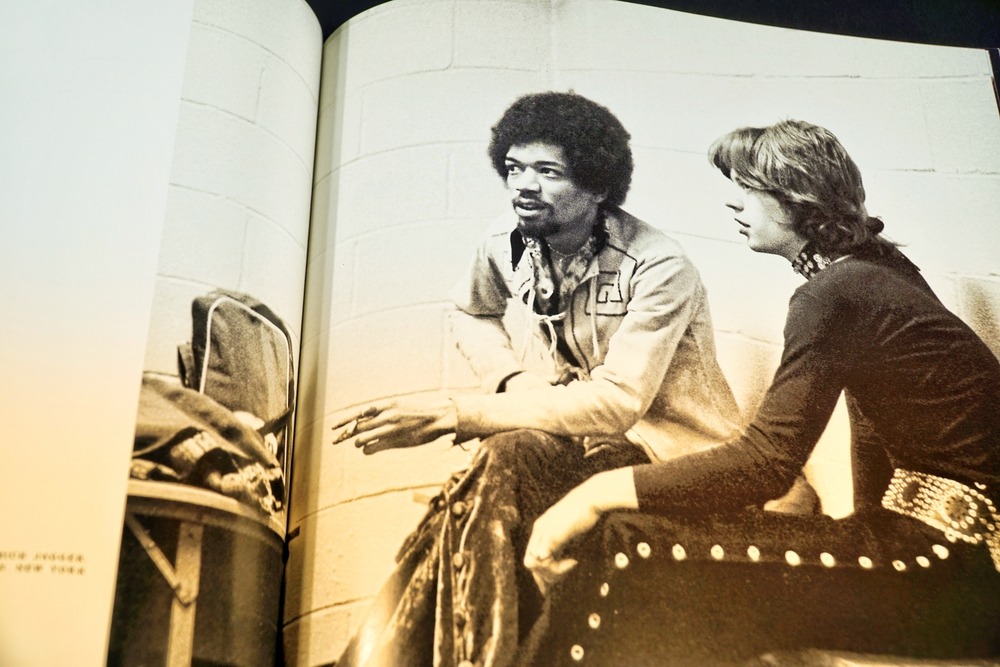
Earlier this month on a #ThrowbackThursday, I republished a post showcasing the “Mt. Rushmore of Classic Rock.” Although it was several years old, it sparked a strong response from many of you. Many of you took the time to “vote” for your all-time favorites.
 And a couple weeks later, I posted the results: while scores of great artists drew support, Jimi Hendrix, John Lennon, Mick Jagger, and Robert Plant earned their place as the four heads on the Black Hills of South Dakota. (And as the format veers away from the 60’s and 70’s, while leaning into the 80’s and 90’s, the most impactful era of the music is obvious – and ironic).
And a couple weeks later, I posted the results: while scores of great artists drew support, Jimi Hendrix, John Lennon, Mick Jagger, and Robert Plant earned their place as the four heads on the Black Hills of South Dakota. (And as the format veers away from the 60’s and 70’s, while leaning into the 80’s and 90’s, the most impactful era of the music is obvious – and ironic).
To someone who’s been in the backroom of the Classic Rock format since it launched nearly four decades ago, none of this is a surprise to me. The format’s original home was AOR – or Album Oriented Rock. From its beginnings, the artists drove everything – the music, the concerts, the culture. Here we are in 2023, and we’re celebrating a week when both the Beatles and the Stones will be looking for “adds.”
For fans, the Mt. Rushmore exercise is a natural – the kind of conversation that might take place over beers. When it comes to music, we all have our unique favorites, but there’s a shared belief that a handful of brilliant, creative musicians made much of what we all call Classic Rock possible. From this elite group, many disciples have followed, spreading the power of the music to generation after generation.
All this took on an even more fascinating perspective last week when Universal Music Group released their Q3 results. Without taking a deep dive into UMG’s financials, which are complex considering they generated revenue of nearly $3 billion for the quarter, nearly two-thirds of which was comprised of recorded music (physical and streaming).
UMG’s artist-centric approach to running a vast multimedia entertainment company has sparked criticism from music makers who feel most of the available slots are taken up by UMG’s “Mt. Rushmore artists,” among them, Taylor Swift, Morgan Wallen, Olivia Rodrigo, and the aforementioned Beatles and the Stones. Critics feel “the usual suspects” get the lion’s share of the love and attention from the label making it different for fledgling artists to break through.

The fireworks on the call came from none other than UMG CEO Lucian Grainge who defended the company’s artist-centric business model:
“I have a reputation for being blunt, so I’ll be blunt, Those peer groups who have expressed the concern about artist centric are unsurprisingly those whose business model is based on being merchants of garbage. Sorry, I can’t really think of another word for content that no one really actually wants to listen to.”
Sir Lucian’s entire career has been spent in the music business, including A&R (his first signing was the Psychedelic Furs). After holding down other executive positions with UMG, he was named CEO in 2011. So, he’s seen it all. To that point, he adds this perspective:
“I’ve been in this business my entire career, and if you like The Beatles or The Rolling Stones (which are two critical releases for us this week), or if you think that Taylor Swift is one of the most significant generational artists of the last 40 or 50 years, or you believe that the performance of Olivia Rodrigo – is one of the artists that we’ve signed recently and delivered worldwide.
“If you like listening to Eminem, if you believe in Elton John, if you enjoy Queen, then these are professional artists. And they are not vacuum-cleaner sounds or rain on a pane of glass, gaming the system.”
This is obviously a music icon who has an intrinsic belief in the talent and star power that moves the needle in the increasingly complex musical ecosystem.
In recent years, many stations from multiple formats have struggled during “sorts” of music tests to find enough music from the past decade or two that is worthy of airplay. Yet, catalog material, often from a limited group of core artists continues to comes through with flying colors. These music reshuffles often cause me to think a great deal about the power of artist brands, and how most up-and-coming artists can possibly compete.
 In “rock world,” once you get beyond Metallica (not exactly a 2000’s band), there are few current-ish artists with the pull to land multiple newer titles on the front page of the best-testing songs.
In “rock world,” once you get beyond Metallica (not exactly a 2000’s band), there are few current-ish artists with the pull to land multiple newer titles on the front page of the best-testing songs.
Very few new bands (on the rock side) have established themselves as sustainable brands capable of generating repeat music sales, racking up consistent arena sellouts, and becoming merch monsters. As Grainge notes, labels are always going to put their chips down on artists with the ability to establish the best track records for sales, live performances, and merch.
So, have we evolved into a Mt. Rushmore world for music in most formats, often dominated these days by a handful of artists? Do new performers have the same ability to get signed and promoted in 2023 as they did a half century ago in 1973?
Grainge’s diatribe appeared in a Digital Music News story from last week that didn’t include reader comments. But ours are open below (and on my socials), so fire away.
The “merchants of garbage” comment from Grainge is sure to generate strong opinions, and obviously, Sir Lucian knew the hornet’s next he was kicking when he opined on his earning call.
Meantime, the conversation about new music – and how it is supported – continues in tomorrow’s JacoBLOG post – as we look at the world of Country.
- Media And Technology In 2025: Believe It Or Not! - April 18, 2025
- In Radio, You Just Never Know - April 17, 2025
- The Secret To Making A Great Podcast (And Great Radio) - April 16, 2025




‘Merchants of Garbage’ is a good description of a lot of radio these days.
I recently spent some time in the car traveling around my province (I’m in Canada), and channel surfing. I could not really find a station that spoke to me, or for that matter, really spoke at all.
I rarely heard the announcer’s name, didn’t hear songs/artists being announced, barely heard the announcer, but I did hear multiple liners/imaging with the station calls. How is that supposed to make me feel a connection?
At the risk of starting a round of Chicken Little (the sky is falling; the sky is falling!), it seems that management (radio and music) has become focused on too few, or the wrong, metrics.Basically, profits and cost-cutting at the expense of quality of product.
I think that most business people would agree that once you start to cheapen your product/service, the end is in sight.
Speaking of merchants of garbage, what a way to spin the fact that the record companies are bankrupt and can only cash in on catalog and influencers, but I expect that sort of arrogant entitlement from people who bought most of the monopoly board. Reminds me of press releases from a certain radio company. Cute comments might work for social media, but they don’t address actual problems.
What a great Halloween & PPM Week Take Away: “Merchants of Garbage.” Varsity “Trick or Treat!” Sadly being defined as licensed broadcast that does little to serve the community & economy. Let’s work to be “Merchants of Communication” with radio adding safety, business and better way of life building stronger places to thrive. Make it happen with Connected Care taken with what we say and what we play. Thank you, Sir Fred.
Sir Lucian is also a merchant of Garbage.
The early albums by the band Garbage on Almo and Interscope…
Were distributed by Universal.
Imagine what we would be missing out on if no one ever took a risk, only played it safe.
• George Martin wasn’t impressed by the Beatles and refused to sign them, only months before the band hit it big.
• Madonna played her earliest demo for executives at Millennium Records. They turned her down.
• Just before the release of their first single, U2 was dropped from RSO because the CEO wasn’t excited about them.
• Early on several label executives were unable to see past Ed Sheeran’s bright red hair.
• Def Jam signed Lady Gaga early in her career but dropped her before she’d even released her first single.
No one ever achieves greatness by playing it safe.
How many artists these days are working hard to perfect their craft, spending time playing in front of live audiences to see what musical approaches work while they hone their musical chops and learn to play and collaborate with other musicians? Too many are spending time in the basement with their computer, stitching together loops and samples instead of creating original music while they express self-centered musings about how difficult their life is?
Lennon wouldn’t have been on anybody’s Rushmore without the input of McCartney, Harrison, and Starr. Would Jagger be there without Richards, or Plant without Page? Hendrix spent a decade or more becoming an “overnight success,” and paid a lot of dues before being schooled by The Isley Brothers and Little Richard. How many artists these days have done that kind of work?
i appreciate your point of view, Brian. But I think give how tenuous it is for so many fledgling bands, those surviving are most definitely working hard. If you’re not at the top of the pyramid – Taylor Swift, et.al. – you’re huffing and puffing to stay above water.